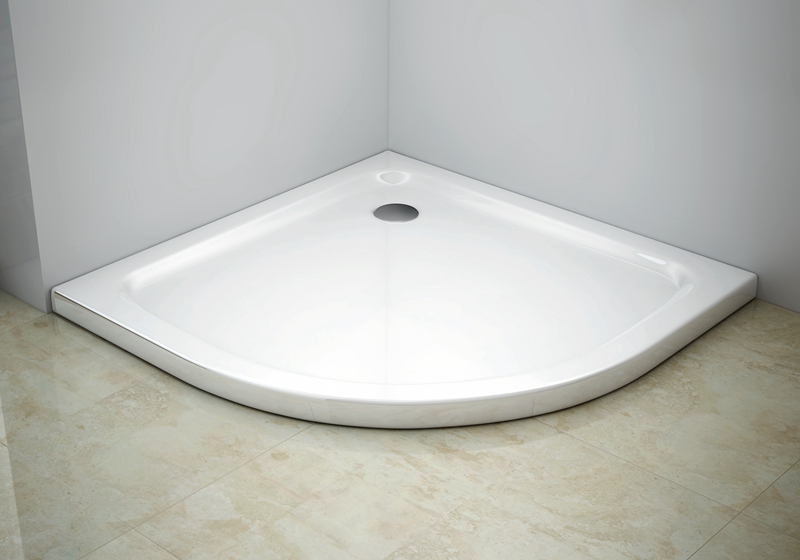ABS (Acrylonitrile Butadiene Styrene) is a widely used material for shower trays due to its durability, lightweight nature, and ease of molding. However, like any material, its performance in resisting cracking, scratching, and staining can vary based on factors such as formulation, manufacturing quality, and usage conditions. Here’s a detailed analysis of how resistant ABS shower trays are to cracking, scratching, and staining:
Cracking Resistance
Impact Resistance:
Properties: ABS is known for its excellent impact resistance, which makes it less prone to cracking under normal use. The material can absorb and dissipate energy from impacts without breaking.
Durability: Under typical bathroom conditions, ABS shower trays can withstand daily wear and tear, including minor impacts from dropped items like shampoo bottles or soap dishes.
Temperature Fluctuations:
Thermal Stability: ABS has good thermal stability, which helps prevent cracking due to temperature fluctuations. It can withstand a range of temperatures commonly found in bathroom environments without becoming brittle.
Limits: However, extreme temperatures or sudden temperature changes (such as pouring boiling water directly onto the tray) can potentially lead to thermal stress and cracking.
Structural Integrity:
Reinforcement: Many ABS shower trays are reinforced with additional materials or structural designs to enhance their rigidity and prevent stress cracks over time.
Installation: Proper installation is crucial to prevent stress points that can lead to cracking. Ensuring even support and correct alignment helps maintain the tray’s integrity.
Scratching Resistance
Surface Hardness:
Moderate Resistance: ABS has moderate hardness, which provides decent resistance to scratching. It can handle regular use without significant surface damage.
Vulnerabilities: However, sharp objects or abrasive cleaning materials can scratch the surface. Care should be taken to avoid dragging or dropping sharp items on the tray.
Surface Finish:
Coatings: Some ABS shower trays come with additional surface coatings or treatments that enhance their resistance to scratching. These can provide an extra layer of protection against wear.
Texture: A smooth finish can reduce the appearance of minor scratches, while a textured finish might mask them but could be more susceptible to deeper scratches if not properly maintained.
Maintenance and Care:
Cleaning: Use non-abrasive cleaning products and tools to maintain the surface. Regular gentle cleaning helps prevent dirt and debris from causing scratches.
Protective Measures: Using mats or protective layers in high-use areas can help reduce the risk of scratches.

Staining Resistance
Material Properties:
Non-Porous Surface: ABS is non-porous, meaning it does not absorb water or other substances easily. This helps prevent staining from common bathroom products like soaps, shampoos, and hard water deposits.
Chemical Resistance: ABS is resistant to many chemicals, which makes it less likely to stain from exposure to cleaning agents or cosmetic products.
Surface Treatments:
Protective Coatings: Some ABS shower trays are treated with surface coatings that provide an additional barrier against staining. These treatments make it easier to clean and maintain the tray’s appearance.
UV Resistance: High-quality ABS may also include UV stabilizers to prevent discoloration or yellowing due to prolonged exposure to sunlight or UV light.
Cleaning and Maintenance:
Regular Cleaning: Routine cleaning with mild, non-abrasive cleaners can prevent the buildup of stains. Promptly cleaning spills and residues can also help maintain the tray's appearance.
Avoiding Stain Sources: Avoid using or spilling substances that are known to cause stains, such as hair dyes, in the shower tray area.
Summary of Resistance Levels
Cracking: ABS shower trays offer good resistance to cracking due to their impact-resistant and thermally stable properties, especially when reinforced and properly installed.
Scratching: ABS provides moderate resistance to scratching but can be susceptible to damage from sharp or abrasive objects. Surface treatments and careful maintenance can enhance scratch resistance.
Staining: ABS is generally resistant to staining thanks to its non-porous nature and chemical resistance. Regular cleaning and protective coatings can further improve its stain resistance.
Additional Considerations
Product Quality: The resistance to cracking, scratching, and staining can vary based on the quality of the ABS material and the manufacturing process. Choosing a reputable manufacturer and a high-quality product is crucial.
Usage Environment: The conditions in which the shower tray is used and maintained will also impact its durability and resistance to damage. Proper care and adherence to usage guidelines are essential for longevity.
By understanding the properties of ABS and following best practices for installation and maintenance, you can ensure that an ABS shower tray remains durable and aesthetically pleasing for many years.




 English
English Deutsch
Deutsch
















